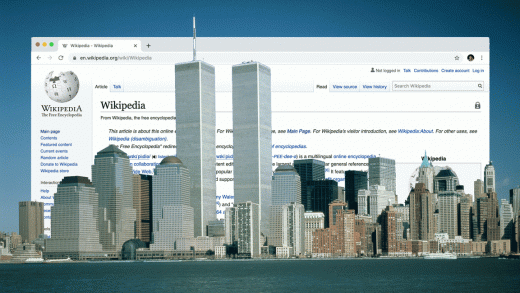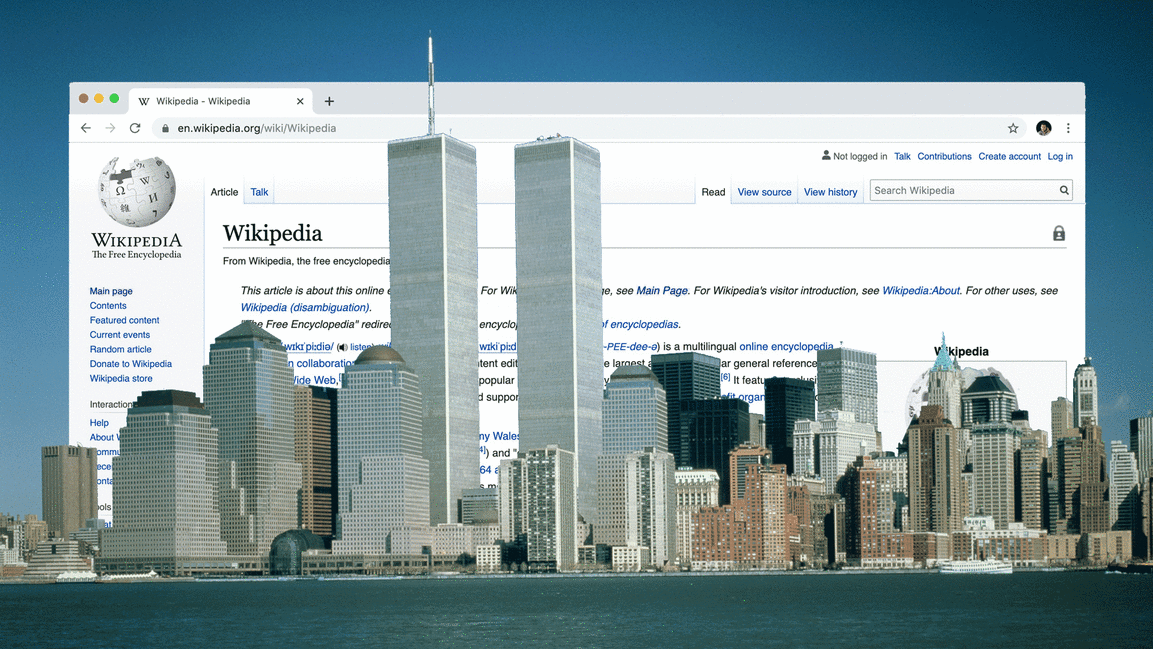How 9/11 turned a new site called Wikipedia into history’s crowdsourced front page
September 11, 2021
A few days after September 11, 2001, as lawmakers were approving a declaration to use military force and people downtown were picking through the rubble, someone in Brooklyn stared bleary-eyed into their computer screen at the history they and some strangers were making.
“I’m a little worn out now, as I’ve spent the last 12 hours straight on this site, so I’ll try to keep this brief,” The Cunctator, as the volunteer editor called themselves, wrote to whomever was out there. “I think that the page September 11, 2001 Terrorist Attack could be one of the great accomplishments of Wikipedia, if everyone gets involved.”
Wikipedia.org had only been launched nine months earlier by a digital ad entrepreneur named Jimmy Wales and a graduate student in philosophy named Larry Sanger. By July, hundreds of visitors were arriving a day, many brought by links that appeared on Slashdot and Kuro5hin and in the results of a new, fast-growing search engine called Google. Many articles were short, amateurish, questionable. But there were a lot of them, and by the start of September, Wikipedia already boasted versions in French, German, Catalan, Swedish, and Italian, and some 10,000 articles in English.
On the morning of September 11, its prospects as a long-term project were far from certain. But as the attacks exposed the weaknesses of America’s 21st century communications, with cell phone networks struggling, first responders’ radios failing, and the world wide web slowing to a crawl, Wikipedia managed to hold up—mostly. At some point, a link to Wikipedia’s 9/11 page appeared on Yahoo’s popular news portal. Traffic began to spike.
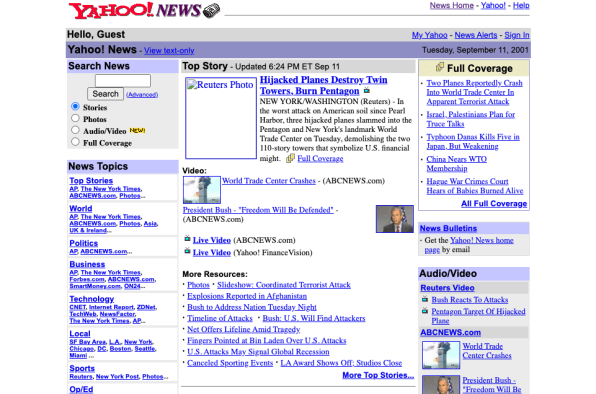
“That brings in this huge influx of editors who are very motivated to do something altruistic online, whatever they can do,” says Brian Keegan, an assistant professor at the University of Colorado, who has studied how Wikipedia responded to the attacks. “You had this massive amount of information-seeking and sense-making that people are trying to make of hugely traumatic events. And here’s this platform that’s set up to receive all this demand, not only from a technical capacity, but socially and organizationally.”
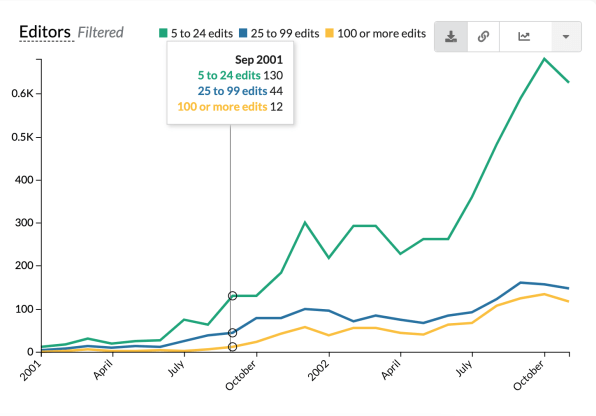
Demand fed supply. New pages related to the attacks appeared, and so did more readers and dozens of new editors and new articles—a virtuous cycle that still propels Wikipedia.
Soon there were about 100 pages related to the attacks: lists of casualties, closings, and cancellations, information on how to donate and volunteer, articles on the political and economic effects, on the buildings, the perpetrators, collective trauma, a timeline, even a page listing rumors and conspiracy theories.
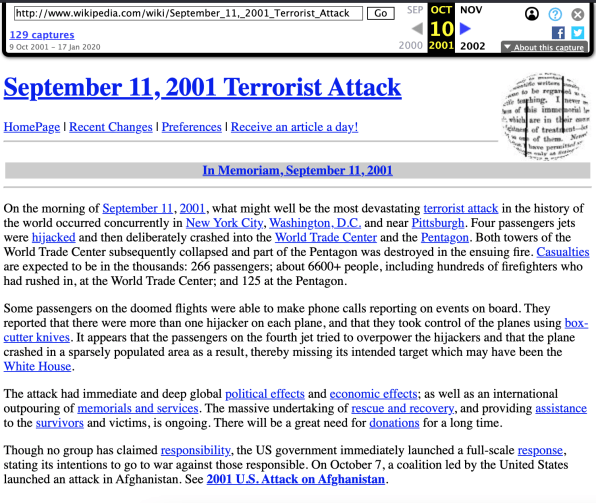
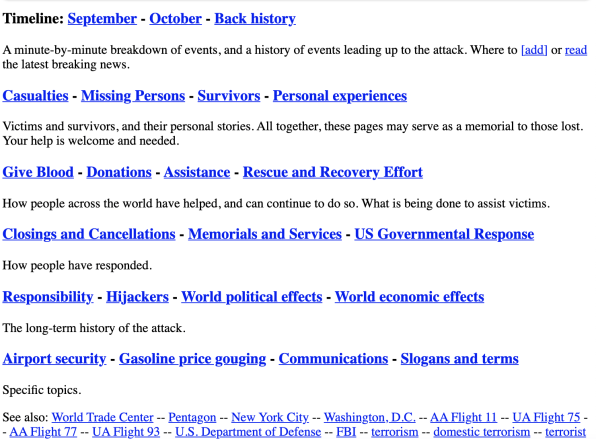
“Already it’s pretty remarkable, and it’s only been four days,” The Cunctator wrote the night of September 14. The volunteer editor, who had joined Wikipedia a few months earlier, explained why they’d been working so hard on the 9/11 articles, especially the memorial pages.
“I live in New York City, and this is the small way I can do something in honor of the thousands of people who died, including the 350 firefighters who died because they rushed in to save people, and in respect for the thousands of people working until they drop, exhausted, after literally days without sleep, digging through the rubbish, cutting through the twisted steel, and getting this city back on its feet. . . . And it’s important that we do get back to normal—but also that we don’t forget what happened. And the only way to prevent that is through the preservation and dissemination of knowledge, the reason for something like Wikipedia.”
The memorial pages The Cunctator created would be largely forgotten, shunted off to a now-defunct site. But the work they and other volunteers did in those early days after September 11 would turn out to be foundational for Wikipedia, laying the groundwork for the speedy, self-organizing approach it still takes to breaking news and everything else. “This was a seminal moment,” says Keegan.
The fight over how to remember
Whatever you think of it, if you’re online, Wikipedia is now almost impossible to avoid. It’s a modern wonder, a monument to collective sense-making, a bizarre counterexample to the rest of the internet. With over 1 billion visitors a month, it now sits just behind Yahoo.com in terms of traffic. Google, the most visited website, depends on Wikipedia for its Knowledge Graph, while YouTube and Facebook help users detect fake news by suggesting links to Wikipedia articles. (Lately, the “September 11 attacks” page makes regular appearances.) There are now over 300 non-English editions, a dozen spin-off Wikimedia projects, and thousands of volunteer-run WikiProjects.
Along with our ideas about collaboration and expertise, it’s also expanded our idea of what an encyclopedia even is. The paper encyclopedia was always about events in the past, but Wikipedia became a living record of history happening right now: police militarization, a pandemic, an attack on the Capitol, the war in Afghanistan.
Today, Wikipedia’s 9/11 coverage spans over 600 pages, covering everything from the Post-9/11 era to the infamous pre-9/11 Presidential Daily Brief, from unsuccessful terrorist plots after 9/11 to little-known figures like ??Abdallah Higazy, an Egyptian American who successfully sued the FBI after he was falsely accused of being involved in the attacks. New articles emerge—though less frequently than they used to—while existing articles are constantly changing, since Wikipedia is never perfect. The other day I noticed an unnecessary hyphen in the article about the attacks, so I logged in and deleted it, quite satisfied at my feat of civic heroism. No other editors seemed to mind.
But in those early, chaotic weeks after 9/11, Wikipedia’s coverage was the focus of intense debates, especially over what—and who—belonged in the encyclopedia. Much of the debate focused on the list of casualties, which included an entry for each of the nearly 3,000 victims, sorted by name and location, and categorized as civilian or first responder. Some editors railed against such detail, given all the work it required, ratcheting up discussion of who or what belongs in an encyclopedia.
And so, says Keegan, “you had this really interesting tension that unfolds over, well, we’re not a paper-type of encyclopedia, we’re online, and there shouldn’t be any limits to who or what we should write about.”
Many said the memorial was inappropriate and impractical. Some saw Wikipedia’s maximalist approach to the attacks as a sign of cultural superiority and American chauvinism. “I suggest: Let’s open one sister project for Jewish victims of Auschwitz, another one for German victims of Dresden bombing, another for Stalin’s dictature, another one for Rwandan genocide, and one for the former Yugoslavia,” wrote Eleassar777 in one discussion. “Are all innocent people killed in these slaughterings worth of anything less?”
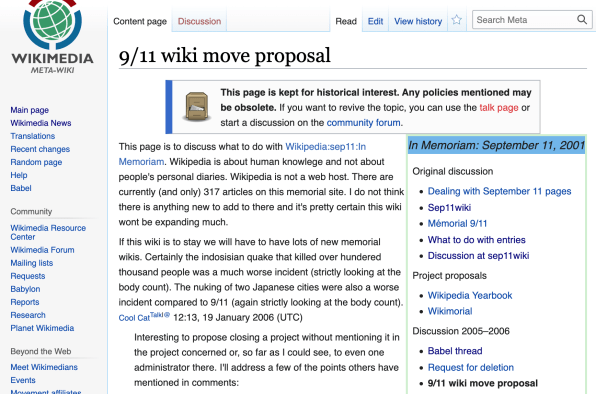
By the following September, the community came to a consensus decision: many of the tributes, the recollections, and other “non-notable” 9/11 content would be migrated to a separate memorial wiki. That in turn led to more debate over which September 11-related articles could stay on Wikipedia and which would be moved. Some worried the wiki would become an easy target for vandals and a poor use of resources. By the five-year anniversary, the memorial was shuttered; these days it’s now only visible on the Wayback Machine, frozen in January 2006.
Keegan sees the memorial as a “cautionary tale” about what happens to a wiki when it no longer has a critical mass of people to maintain it. It was also part of a larger deliberation that transformed Wikipedia. Writing the 9/11 pages helped the community develop its policies about neutral point of view and notability, spurred the addition of current events to the home page, and led to an expansion of Wikipedia’s WP: NOT policy, which predated September 11: Wikipedia, it now asserted, is “not a newspaper” and “not a memorial.”
How to build an encyclopedia
When news breaks, corresponding Wikipedia articles tend to function like “watering holes” for the community, energizing veteran volunteers, recruiting new ones, and bringing together people with disparate talents and experiences. Often that means editors who have no apparent expertise about the topic in question, be it a natural disaster or a political movement like Black Lives Matter. “The most active editors more often than not are coming from well outside of what, given any kind of editorial judgment, you would expect for someone to be qualified or prepared to do,” Keegan says.
This often leads to articles that are longer, better cited and illustrated, and of higher quality than the median Wikipedia page. They tend to win community accolades and dominate Wikipedia’s top article lists. Keegan cites “Linus’s Law,” whereby a large and diverse group of people can accomplish tasks that would seem only possible for a small group of experts to accomplish.
The community’s approach to breaking news echoes the way Wikipedia’s editors and administrators manage the rest of the project: a wide range of sometimes overlapping roles and specialties, along with help from automated maintenance and anti-abuse bots. This distributed, bottom-up approach is one of Wikipedia’s many advantages when it comes to battling abuse and misinformation.
“I read this as another counterfactual to this centralized, automated model that Twitter, Facebook, Google have developed,” says Keegan. “For me, it’s the fact that there are so many different cooks in the kitchen who have their eyes on things in all these different kinds of ways. . . . And if you have evidence of a problem, then there is a place and a process for that.”
To review disputes between editors, English Wikipedia and some other projects have an Arbitration Committee, or ArbCom, composed of volunteer users, that has been called Wikipedia’s “Supreme Court.” Editors have gone to ArbCom to complain about bad behavior or to adjudicate the battles that tend to crop up around controversial topics. What word should be used to describe the war in Afghanistan, or what happened on January 6?
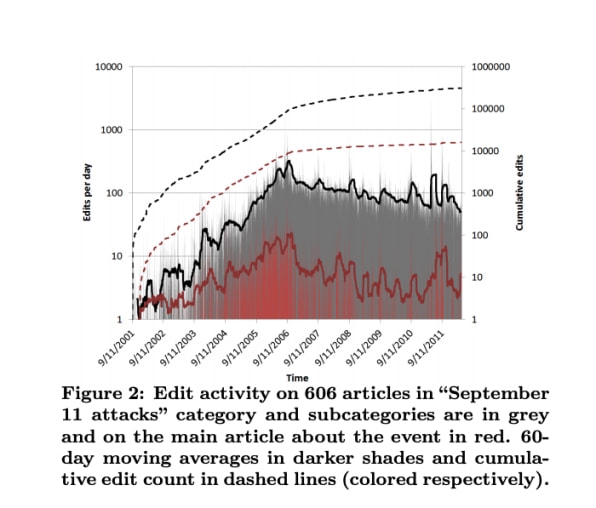
[Chart: Keegan]
It was ArbCom that, a decade after the attacks, stepped in to address another heated debate at the 9/11 page: Where do conspiracies fit into the account of that day’s events? Since then, there has been a concerted effort to omit mention of—or simply link to—the conspiracy theories. Ugly edit wars broke out. A number of editors were banned. The main 9/11 page is now semi-protected, a tool used on many high-profile articles to regulate how new users can make changes. There’s even a Wikipedia policy around how to treat fringe theories. “Those editors [pushing conspiracy theories] generally don’t get much traction or effect change to the articles,” says Molly White, a longtime editor.
Still the conspiracy mongers, or at least the sympathizers, have only become a more widespread concern: The past year’s endless stream of momentous events has been accompanied by all kinds of truth-bending, from COVID-19 to the election to January 6. There’s also the ongoing problem of harassment: since starting to work on Wikipedia’s extremist-related articles, White has “had multiple people threaten me with lawsuits, try to get me fired, try to find out where I lived, and threaten to show up at my house and/or be violent towards me or my pets.”
Community-built policies, penalties, and methods like page protection can be powerful tools for combating misinformation and bad behavior, but they can come at the cost of turning off new editors. That’s a cost that Wikipedia can’t afford as it tries to grow its audience and editor base, which is still mostly made of white men from America and Europe.
“So many people have information needs that we’re not meeting today,” Katherine Maher, the former CEO of the Wikimedia Foundation, told me earlier this year. “If we truly want to serve the world, what do we need to do to ensure that knowledge is representative, knowledge has range, knowledge is inclusive of the sort of lived experience around the globe? And how do we get people engaged in building that knowledge?”
Dismal as they are, Wikipedia’s 9/11 pages are a positive sign for the future. Ever changing and growing and hyperlinked to each other, they’re an antidote to forgetting, a reminder that the past is never past. Born in an emergency, during a moment of unusual unity, they’ve also been a model for all the collaboration that followed. The pages’ earliest edits were lost during a server move, but over nearly two decades, their revisions and talk pages have given us a messy, impressive record of strangers making decisions, sharing feelings, writing the first draft of history, and the second, and the third, and so on, and doing it together. When facts seem perpetually warped and weaponized by warring tribes, the process doesn’t just produce pretty good encyclopedia entries but a kind of refuge.
“It was a real pleasure to be part of building something meaningful and historical, and that also was quite possibly uniquely accurate, comprehensive, and immediate,” The Cunctator, who requested anonymity, wrote in an email to me recently. “For Wikipedia, it was also very much a time of developing norms,” a process they chronicled in an essay, “How to Build Wikipedia.”
Less easy to measure was the personal impact, the power that came from helping. “I spent the day walking around Brooklyn, watching people stream over the bridge, as the smoke from the towers crossed the perfect blue sky,” they remembered. The smoke blew over their apartment all afternoon and evening. “I spent the next weeks immersed in the radio, television, newspaper, and internet reports, and building the September 11th suite of pages kept me from falling prey to a sense of powerlessness.”
Fast Company , Read Full Story
(40)

